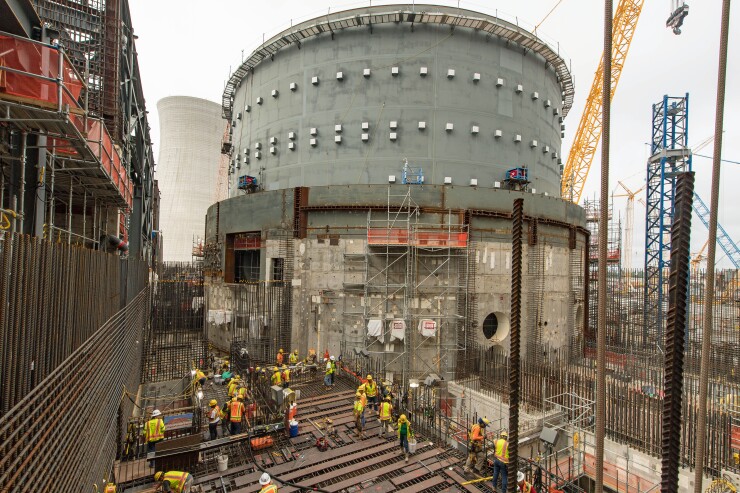Two public power agencies have sued each other to determine the validity of an agreement that supports debt that was issued to finance a portion of the twin nuclear reactors under construction at Georgia’s Plant Vogtle.
The Municipal Electric Authority of Georgia filed

MEAG is seeking a declaratory judgment in an attempt to force JEA to abide by its 20-year power purchase agreement, according to the suit filed in U.S. District Court for the Northern District of Georgia Tuesday.
JEA, also on Tuesday,
The complaint claims that the PPA, first approved in 2008 and amended in 2014, should be vacated because it was never approved by the Jacksonville City Council as required by Florida’s constitution, and that it violates the city charter as well as Florida’s public policy.
“A favorable judgment from the court deeming the agreement void will have the added benefit of providing relief to ratepayers across northeast Florida from having to shoulder the financial burden of this project,” said JEA interim CEO and Managing Director Aaron Zahn.
The PPA requires that JEA pay capital and other expenses as well as a portion of the debt service on $2.9 billion of bonds MEAG issued to finance its 22.7% ownership interest in the reactors, and $1.2 billion in loans backed by U.S. Department of Energy guarantees, according to MEAG’s three-count complaint.
JEA, which has a take-or-pay power purchase agreement with MEAG, is obligated to pay debt service on $1.42 billion of Project J bonds. The Superior Court of Fulton County, Georgia, validated the debt in 2008.
The legal challenges are based partly on recent correspondence from JEA demanding that MEAG agree to cancel the project in an upcoming vote by the co-owners. The vote, to determine if work will continue, was triggered by an announcement last month that the cost to complete the reactors will increase by more than $2 billion.
JEA also threatened to take legal action if construction continues, and MEAG doesn’t agree to discuss terms that would allow JEA to exit its agreement.
“This was not an action we wanted to take, but we filed this lawsuit to protect the interests of the participant communities that we serve,” MEAG President Jim Fuller said Wednesday.
The nonprofit Georgia utility is a joint-action agency that supplies wholesale electricity to 49 communities across the state.
MEAG’s suit also contends that JEA has taken steps to undermine its ability to finance its share of the reactors costs.
On Sept. 5, JEA told the USDOE that it wanted the project terminated, according to the complaint. Two days later, the USDOE wrote to MEAG saying that the federal agency would “evaluate the impact of JEA's recent statements on MEAG's existing DOE-guaranteed indebtedness within the context of the provisions of the existing loan guarantee agreement.”
“JEA’s actions have already had their intended effect: to interfere with and destabilize MEAG Power’s access to credit in order to force MEAG Power’s hand in the upcoming vote,” MEAG’s suit said.
A vote against continuing construction on the reactors would be an event of default under the loan guarantee agreements, MEAG said.
Last month, Georgia Power Co., the investor-owned utility heading up the project, disclosed that it believes it will cost the co-owners an estimated $2.2 billion more to complete the twin reactor project.
GPC will provide more detail on the exact completion cost in a report to the Georgia Public Service Commission Sept. 20, after which the four owners will vote on whether to continue with construction. The project is about 67% complete.
MEAG and the other public power owners will share in the higher cost according to their ownership stakes. Oglethorpe Power owns 30% and the city of Dalton owns 1.6%.

MEAG also has a power purchase agreement with PowerSouth Energy in Alabama, a cooperative that will buy electricity produced by the new reactors.
In an Aug. 17 letter, JEA’s Zahn called the two reactors “economically obsolete,” and said a consultant for his agency had found that it would be less costly to JEA if the project was canceled. He also demanded that MEAG vote to terminate the project.
If the reactors are not completed, JEA would save between $345 million to $727 million, according to a draft executive summary of an economic analysis by Chicago-based Navigant dated Sept. 12, 2017. The analysis was attached to Zahn’s letter and marked confidential.
The Navigant report apparently was prepared last year when owners of the reactors were deciding if the $25 billion project should go forward. That amount, double that of the original cost estimate, was approved by the Georgia PSC in December.
But in August, just eight months after approval of the $25 billion cost estimate, Georgia Power said the cost had surged partly because of changed assumptions related to finalizing contracts and management responsibilities for Bechtel Power Corp, which became the prime construction contractor after Westinghouse Electric Co. filed for bankruptcy in March 2017.





